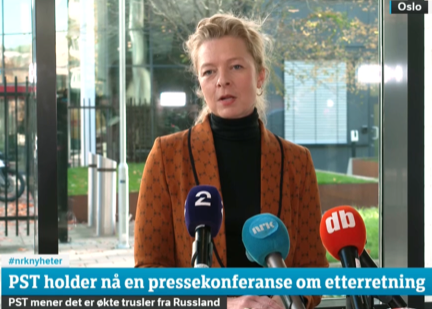Norway’s state prosecutor has asked police intelligence agency PST to take on “centralized responsibility” for the investigations into a rash of illegal drone activity in Norway. Another Russian citizen with reportedly close ties to Russian President Vladimir Putin, meanwhile, has been arrested in Northern Norway after flying drones on strategically important and Norwegian-controlled Svalbard in the Arctic and perhaps elsewhere in Norway.

The Barents Observer reported Wednesday that the 47-year-old man arrested in the northern city of Hammerfest is the son of a close Putin ally who’s on the US’ sanctions list. He was taken into custody after arriving in Hammerfest on a sailboat, which has been sailing extensively along the Northern Norwegian coast and up to Svalbard over the past few months.
Anja Mikkelsen Indbjør told Norwegian media on Wednesday that the man has both Russian and British citizenship. Police who searched the sailboat in Hammerfest seized both a drone and other “electronic devices” that are now undergoing “technical review.” Photos from the drone, Indbjør told state broadcaster NRK, “are of great significance for the case.” Police also found the man’s Russian passport in his cabin on the boat.
A local court in the northern county of Finnmark ordered the man held in custody while the police and PST continue to investigate the case. Indbjør said the man, whose residence is registered in Italy, has admitted to flying a drone on Svalbard. Sanctions against Russia have made it illegal for Russian citizens to operate drones in Norway, but his defense attorney claims his client should be viewed as a British citizen, not Russian, and is appealing the custody order.
Representatives for the defendant, described as a “businessman” with dual citizenship, also denied to newspaper VG that he has any connection to the Russian president or Russian authorities. He claims he was merely on holiday when he was arrested and was using a “hobby drone” during a holiday on Svalbard in August. “He is passionate about nature, photography and extreme sports,” his representatives told VG.
Sabotage threat higher
PST declined to comment on specifics of the investigation at a press conference Wednesday afternoon. PST Deputy Director Hedvig Moe said, however, that after seven Russians have now been arrested in Norway for violating photography and drone regulations, the agency views the pressure of espionage against Norway as even stronger and that the sabotage threat has risen. There’s also, in PST’s view, more danger of digital attacks, with the oil and gas sector, defense and those working with critical technology among the targets.
She noted that Russians have likely been gathering information about Norway’s offshore areas for years. “So can we ask ourselves what’s the purpose of this drone activity,” Moe said. “It can be used for espionage or to create fear and uncertainty around Norway’s ability to deliver gas to Europe. It’s important for me to report that those of us in PST can’t conclude who’s behind this or what they want to achieve.”
A “worst case scenario” would be an act of sabotage, she noted. “We don’t evaluate that as probable today, but it can’t be ruled out.” She stressed that Norway “is not at war” itself, but “as we see it, Russia has more to win than lose by carrying out intelligence gathering in Norway,” which has been actively supporting Ukraine and now ranks as the largest supplier of natural gas to Europe. PST wants to make any such work by the Russians more difficult.
Prime Minister Jonas Gahr Støre was also among the many reacting to more cases of illegal drone activity and Russians being arrested. “It’s of course not acceptable that foreign intelligence (agencies) are flying drones over Norwegian airports,” he said at a large labour union meeting in Oslo on Wednesday. He was referring to reports earlier in the day about drone sightings that temporarily closed airports in Bergen and Førde.
“Russians are not allowed to fly drones in Norway,” Støre exclaimed. “We don’t want to have anyone flying around important installations in Norway. We say ‘no’ to that and we will stop it.”
He claimed there’s been no direct threats lodged against Norway, “but the situation is serious. This is a new security policy situation.” He described Russia today as a “militarized, radicalized and in many ways totalitarian society,” run by a man carrying out a “long, brutal and destructive war with broad consequences.”
NewsinEnglish.no/Nina Berglund

